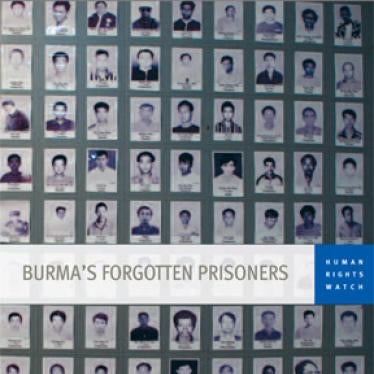(New York) - Newly issued laws in preparation for 2010 elections in Burma are designed to exclude the main opposition party and ensure a victory for the ruling military, Human Rights Watch said today.
The ruling State Peace and Development Council today released the Political Party Registration Law, which includes provisions barring prisoners from being members of political parties. The law effectively excludes more than 2,100 political activists currently imprisoned on politically motivated charges, including Aung San Suu Kyi, the leader of the opposition National League for Democracy (NLD). Provisions included in the law instruct any party wishing to register to expel members currently serving prison terms. A party that fails to do so will lose its registration and be unable to contest the elections.
"The new law's assault on opposition parties is sadly predictable," said Brad Adams, Asia director at Human Rights Watch. "It continues the sham political process that is aimed at creating the appearance of civilian rule with a military spine."
Yesterday the military government released the first of five laws in preparation for long promised polls in 2010, whose official date has yet to be announced. The Political Party Registration Law states that, "A prisoner may not be a member of a political party." The law also requires existing political parties, such as the NLD, which won the 1990 elections, re-register within 60 days of March 10.
Human Rights Watch believes that there are 429 members of the NLD currently imprisoned, including 12 members elected to parliament in 1990. Aung San Suu Kyi will be effectively barred because she is currently serving a term of house arrest following her conviction in 2009 on politically motivated charges of permitting an intruder into her house in Rangoon while she was under house arrest imposed since 2003. Human Rights Watch is calling for the immediate and unconditional release of all political prisoners in Burma through its 2,100 in 2010: Free Burma's Political Prisoners campaign.
"The law requires the NLD to choose between participating in the elections and keeping its leader and hundreds of its unjustly imprisoned members," said Adams. "This is a choice that no political party should have to make and is a transparent attempt to knock the main opposition party out of the running."
Other laws reportedly to be released this week include provisions for the upper and lower houses of parliament and the 14 regional parliaments as outlined in the 2008 constitution.
The release of the laws is the penultimate step in the military government's long drawn out "Road Map to Disciplined Democracy," a repressive process that has seen political parties deregistered and in some cases outlawed, and thousands of activists sent to prison.
The NLD overwhelmingly won the last elections held in Burma in 1990 with more than 80 percent of the seats and 60 percent of the popular vote. The ruling junta ignored the result and announced plans to write a new constitution, which began in 1993 and only concluded in September 2007. The new constitution, released in 2008 and endorsed by an implausible 92 percent of the population in an orchestrated referendum in May 2008, grants sweeping powers to the military. These include one-quarter of lower house seats and one-third of upper house seats in the parliament reserved for serving military officers, as well as immunity for military personnel from civilian prosecution and the reservation of key ministerial portfolios to serving military officers.
The United Nations Secretary General Ban Ki-moon has called for "the release of all political prisoners, including Daw Aung San Suu Kyi, and their free participation in the political life of their country; the commencement of dialogue between the Government and opposition and ethnic stakeholders as a necessary part of any national reconciliation process; and the creation of conditions conducive to credible and legitimate elections." Close allies of Burma, including China, have called for an inclusive political process.
"Any optimism that these elections will usher in a period of change in Burma is cynically misplaced," Adams said. "The Burmese government is demonstrating contempt for the democratic process, the people of Burma, and international opinion, including its friends in China, India, and ASEAN, who have asked for an inclusive political process."





